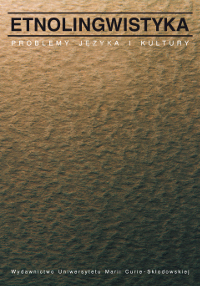Leksem ie ‘dom’ w językowokulturowej tradycji Japonii
The lexeme ie ‘home’ in the liguistic-cultural tradition of Japan
Author(s): Katarzyna WyszpolskaSubject(s): Anthropology, Language studies, Language and Literature Studies, Applied Linguistics
Published by: Wydawnictwo Naukowe Uniwersytetu Marii Curie-Sklodowskiej
Keywords: linguistic worldview; cognitive definition; Japanese linguistic-cultural tradition; ie ‘home’; stereotype of home
Summary/Abstract: The author attempts to sketch a cognitive definition of the Japanese lexeme ie ‘home’, concentrating on the universality of the home. By comparing the image of home in Japanese and Polish, she wants to establish which features of home may be considered universal and which characteristic of a given culture.The analysis begins with an identification of four dominant meanings of ie: ‘dwelling place’, ‘stock’, ‘school of craft’ and ‘family, household’. A detailed investigation of the meanings leads to the conclusion that the senses ‘dwelling place’, ‘stock’ and ‘family’ function in European cultures in a way similar to Japanese, but the sense ‘school of craft’ is very distant from the European context. In Japan, the home is not only a community of people related to one another but also engaged in a common craft. Revealed here are also peculiar features characteristic of the Japanese home, such as the coexistence of many generations or a complex structure. This picture, however, is being gradually modified as a result of changes in the Japanese language and culture under the influence of globalization, due to which the stereotypical home seems less and less connected with tradition and more and more with contemporary international culture.
Journal: Etnolingwistyka. Problemy Języka I Kultury
- Issue Year: 22/2010
- Issue No: 22
- Page Range: 173-182
- Page Count: 10
- Language: Polish

